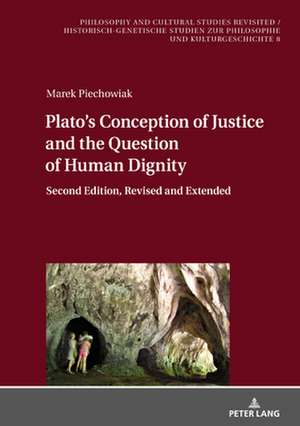Plato's Conception of Justice and the Question of Human Dignity: Philosophy and Cultural Studies Revisited / Historisch-genetische Studien zur Philosophie und Kulturgeschichte
Autor Marek Piechowiaken Limba Engleză Hardback – 24 feb 2021
| Toate formatele și edițiile | Preț | Express |
|---|---|---|
| Hardback (2) | 422.26 lei 6-8 săpt. | |
| Peter Lang Copyright AG – 24 feb 2021 | 422.26 lei 6-8 săpt. | |
| Peter Lang Copyright AG – 5 feb 2019 | 450.86 lei 6-8 săpt. |
Preț: 422.26 lei
Preț vechi: 548.38 lei
-23% Nou
Puncte Express: 633
Preț estimativ în valută:
80.87€ • 83.32$ • 67.74£
80.87€ • 83.32$ • 67.74£
Carte tipărită la comandă
Livrare economică 24 februarie-10 martie
Preluare comenzi: 021 569.72.76
Specificații
ISBN-13: 9783631845240
ISBN-10: 3631845243
Pagini: 298
Dimensiuni: 148 x 210 mm
Greutate: 0.55 kg
Editura: Peter Lang Copyright AG
Seria Philosophy and Cultural Studies Revisited / Historisch-genetische Studien zur Philosophie und Kulturgeschichte
ISBN-10: 3631845243
Pagini: 298
Dimensiuni: 148 x 210 mm
Greutate: 0.55 kg
Editura: Peter Lang Copyright AG
Seria Philosophy and Cultural Studies Revisited / Historisch-genetische Studien zur Philosophie und Kulturgeschichte
Notă biografică
Marek Piechowiak habilitated in philosophy and is a professor of legal sciences. His scholarly work primarily concerns the philosophical foundations of international and constitutional protection of human rights, including in the historical perspective. He works in the Institute of Law at the SWPS University.
Cuprins
Dignity as the fundamental value in law - Plato on dignity in Timaeus - The Republic on the individual and justice in the model of the state as a phantom of justice - Justice and freedom - Equality and friendship as the aim of law - The individual as the object of love - Just actions over contemplation.
Descriere
In this first comprehensive study of Plato's conception of justice, the recognition of human dignity plays a crucial role for understanding the individual in relation to the law and state. Plato's philosophy turns out to provide foundations for modern-day human rights protection rather than for totalitarian approaches.








